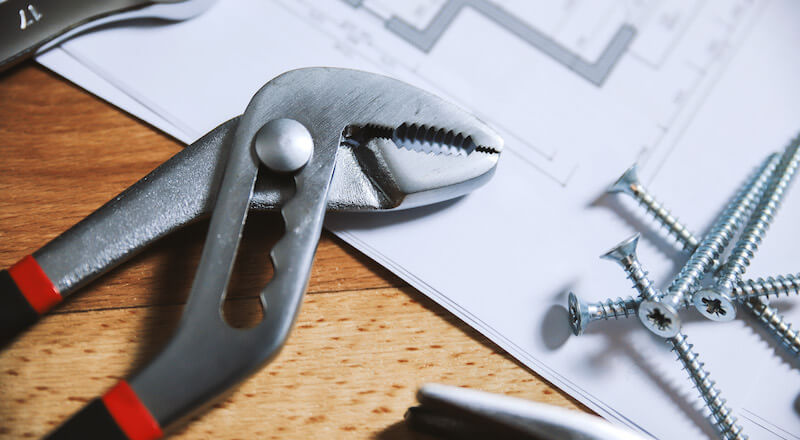If you’ve found the perfect plot of land you want to live on, but it needs a house, you can finance the building of a new home with Vancouver construction mortgages. These can also be referred to as a “builder’s mortgage” or a “progress draw mortgage.”
Mortgages for building a house are available to Metro Vancouver and B.C. residents, but with some caveats. It’s important to know what their limits are, and the likelihood that you’ll qualify for them. They can be complex to navigate through, since the banks won’t just hand out funds for DIY projects without a clear plan in place. Everything is documented, and even lawyers are involved.
That said, if you can qualify for them, they can pay off in a big way. They can increase the value of an existing lot of land. And in some cases, they can motivate contractors to work before their typical payment schedules, since the lender funds are held by a trustworthy lawyer, not you. The lawyer is good for the money, because they can only pay the contractor with the amounts you’ve been approved for (or, they can reimburse you after you’ve paid those bills).
A good mortgage broker can help you apply for these mortgages in a way that is likely to get approval. They can also guide you through their intricacies, and be your voice when it comes time for negotiations.
Curious to know more? Get in touch with us today! We’ll find out how close you are to building your dream home!
Email: simon@bcmortgagesolutions.ca
Tel: 604-495-8787
Cell: 778-929-3678
Looking to renovate with your home purchase? Click here for more information.
You may also be interested in:
- Mixed-use development mortgages
- Multi-family residential mortgages
- Agricultural and bare land mortgages
Below, we’ll answer some common FAQs about construction draw mortgages in B.C.
How do Vancouver construction mortgages work?
When you buy a pre-built home, you are essentially borrowing money from a lender to pay for most of it upfront. This is a traditional mortgage (in simplified terms).
With a construction mortgage, the upfront amount you borrow is not to buy a pre-built home; it is to pay for the construction of a future home. Since the home does not yet exist, you are lent cash funds to create it, based on the premise that it will be worth something of tangible value, in due time.
Read moreIn either scenario, you pay the lender back for something. A construction mortgage simply makes it possible to take out a large loan so you can build your dream house.
Now, this can sound too good to be true. In a way, it is. This type of scenario works well for those who are experienced at home building projects, or who have the resources to hire someone who is.
The mortgage application will require documentation on several stages of your project, before they begin (see more below). Everything from land surveys to obtaining an occupancy certificate must be planned in advance. That includes utility connections, road access, foundations, roofing, electrical fittings, drywall, paint and the whole shebang.
Timelines matter a lot, too; lenders want to know that their money is being used wisely, and for profit. In a positive way, this will keep you diligent to stay on schedule. But if you can’t, for whatever reason, you’ll end up ‘in a pickle.’
To learn more about this type of home financing, it may be easier to talk with a mortgage specialist. Contact us today, and we’ll learn more about your case. From there, we can make recommendations that suit your needs:
Email: simon@bcmortgagesolutions.ca
Tel: 604-495-8787
Cell: 778-929-3678
What are the caveats builder’s mortgages that I need to know up front?
The process of applying and maintaining a builder’s mortgage can be complex and detailed. You’ll need to work closely with your mortgage broker, lawyer, contractor and real estate agent during the process to know more about your obligations.
In general, the following considerations should be taken into account when seeking to finance the construction of a new home:
Read more(Click on an item below to read its details)
The future home must be easy to resell
Most approved projects are based on homes that can easily be re-sold, in case things ‘go south.’ That means typical-looking, reasonable-sized homes with rental units, near a city.
If you want to build an underground bunker 5 hours from the nearest international airport, you probably won’t get approved for this type of mortgage. That’s an extreme example but, you get the idea. Off-grid cabins in the wild, or houses on 10-acre farms probably won’t fly either.
The lender’s cash won’t be available in advance
Draw allowances are contingent on work being completed. They are not available for work-to-be-done.
In general, a typical draw schedule is drafted as follows:
15% – used towards excavating the land and completing the foundation. This is optional, for insured mortgages only.
25% – used towards roofing and weather protection. The home should be about 40% complete, airtight and secured.
25% – used towards plumbing, electrical wiring, drywall, furnace installation, exterior wall cladding, etc. The home should be 65% complete.
20% – used towards kitchen cupboard installation, bathroom completion, door hanging, tile and floor laying, painting etc. The home should be 85% complete.
15% – used towards all other work on the home, such as exterior and seasonal work. The home should be 100% complete, and ready for occupancy.
Further to the above, you’ll need your own cash to pay for contractors and supplies before the lender releases funds via your lawyer, per your agreed-upon schedule of draws.
The contractor needs to agree to a similar schedule ahead of time. The lender will check to see that your payment schedule with the contractor doesn’t veer too far off from your draw schedule.
The lender will also want proof that you have access to sufficient cash to keep the project moving until draws are released, or in case you go over-budget.
Some construction mortgages will only release funds after full completion, and not in stages. These types of mortgages are more common.
The contractor must be qualified, and the home must be registered
The builder must be part of a New Home Warranty Program (where your project will be registered). They must be able to build according to the National Building Code of Canada. It goes without saying they should be licensed contractors, too.
You can act as the builder, if you can prove you have the knowledge and skill to do it. However, even if you do, this will take up a considerable amount of time and energy on your part, which may not be viable. Of course, the quality of your build must meet all the above standards.
You may not own the land until the project is complete
In some cases, you can buy the lot, and present the title deed to the lender. In other cases, the contractor will own the lot, and agree to pass it to you after they are paid in full. You’ll need to make an official purchase offer to show the lender that this is your plan.
If your project goes over-budget, and you don’t pay your builder, they can file a builder’s lien against your home. So, it is critical to avoid going over-budget.
There will be additional, out-of-pocket fees to pay for
Blueprints, design plans and building permits should be ready-to-go for your mortgage approval. You’ll need to pay for this out-of-pocket.
Inspections will be needed to verify each stage of completion, before draws are released. Most of the time, these services will need to be paid for by you.
Funds held by your lawyer, from your lender, will always withhold a 10% builder’s lien. This is in case you owe your builder for any outstanding bills at the end of your project. It is required by law.
Budgets and plans will be more or less ‘set in stone’
You won’t be able to adjust your mortgage for home upgrades, once it is approved. There may be other means of obtaining funds, if it turns out you do want to make changes that will go over budget. Your mortgage broker can help you investigate your options.
If you think you can meet the basic requirements of a progress draw mortgage, we can help you with the rest. Contact us today, and we’ll help you sort out the details:
Email: simon@bcmortgagesolutions.ca
Tel: 604-495-8787
Cell: 778-929-3678
How much can I get to build my own home with a construction mortgage?
The amount you can borrow to build a home with a construction mortgage will depend on several factors that are unique to you. It is a lot like applying for a so-called, ‘regular’ mortgage. The lender will look at how reliable you will be as a borrower. You should have a down payment ready, a stable job with sufficient income to pay for your project, a good credit score, and more.
Read moreEach lender will have their own criteria for evaluating your case. Not many lenders will take on this type of mortgage, since it involves a lot of risk. Experienced mortgage brokers can help you find them, however.
A mortgage broker can also assist you in gathering the materials needed to document your eligibility for this type of program.
Contact us today, and we’ll guide you through the process:
Email: simon@bcmortgagesolutions.ca
Tel: 604-495-8787
Cell: 778-929-3678
Your ‘forever home’ may be hard to find, but you can create it with the right mortgage broker at your side
While a progress draw mortgage or a construction mortgage in Vancouver can feel like a complex maze to get through, it doesn’t have to be. Mortgage brokers are trained to figure out all the equations, and put the ‘puzzle pieces’ together for you. They can work with your lender and real estate agent directly, while giving you tips on how to communicate with your contractor.
Before you go down a rabbit hole of confusion, mortgage professionals can tell you whether you’re likely to be approved for a builder’s mortgage in B.C. They can also prepare your application, making it more appealing to lenders by highlighting your strengths.
And, if your application is rejected with one lender, that doesn’t mean all hope is lost. Independent, Metro Vancouver mortgage brokers can search the ‘hidden’ market to find you a lender that is more likely to approve your plans.
There’s no need to wait for your ‘forever home’! You can create it! Start by giving us a call, and we’ll explain what’s next.
Email: simon@bcmortgagesolutions.ca
Tel: 604-495-8787
Cell: 778-929-3678



